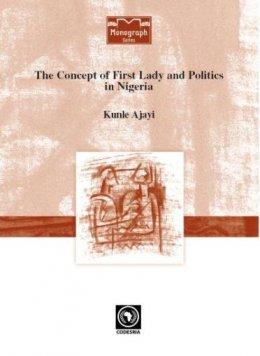The Concept of First Lady and Politics in Nigeria
Keywords:
Concept of First Lady , Politics, NigeriaSynopsis
Women in Nigeria remain victims of gender discrimination, especially in politics. This monograph examines the possibility of utilizing the First Lady’s institution to achieve gender mainstreaming and consequently terminate the sustained feminine marginality in Nigerian politics. The study finds that the First Lady’s office is self-serving as successive First Ladies since the Babangida military era are merely utilizing their positions to mobilize and rally support for their husbands in power. And, depressingly too, the First Ladies used their esteemed positions to exploit the Nigerian rural women, whose poor political and economic lives, ordinarily, they were supposed to use their vantage position to transform for the better. Ultimately, therefore, the First Lady institution in Nigeria is just a conduit pipe for satisfying the material psychology of the First Ladies and bolstering the women’s political support for their ruling husbands.
Downloads
References
Abun-Nasr, J.M., 1975, A History of the Mahgreb, Cambridge, University Press.
Achebe, C., 1958, Things Fall Apart, London: Heinemann.
Achebe, C., 1964, Arrow of God, London: Heinemann.
Achunine, R.N., 2004, ‘Barriers to Access to Leadership positions in Higher Institutions, with Special Reference to Nigerian Women’, The Nigerian Social Scientist, Vol. 7, No. 1, March
Adedokun, O.A., 2000, ‘Women, Empowerment and Reproductive Health: Progress and Prospects for the future in Nigeria’ in J.A. Ebigbola and E.P.
Renne (eds.) Population and Development Issues, Ibadan: African Book Builders Ltd.
African Concord, 1992; African Concord, Magazine, Lagos, 17 August.
African Guardian, 1990, African Guardian, Magazine, Lagos, March 26.
Agomo, C., 2004, ‘The Legal Framework for Gender Equality in Nigeria’ in S.O Akinboye (ed.) Paradox of Gender Equality in Nigerian Politics, Lagos, Concept Publications Ltd.
Ajayi, K., 2003, ‘Bureaucratic Corruption and Anti-Corruption Strategies in Nigeria, 1979 – 2001’ in Godwin Onuled, Corruption and Sustainable Development in the Third World Perspective, Abuja, IPSA RC.4, AFRIVGOV Book Ltd.
Amadi, E., 1966, The Concubine, London: Heinemann.
Amadiume, I., 1987, Male Daughters, Female Husbands, London, Zed Books.
Ayorinde, O., 2006, ‘Ngozi’s Exit’, The News, Lagos, The News Magazine, August 14.
Binuyo, S., 1995, ‘Women and Family Builders’ Sunday Sketch newspaper, Ibadan, January 29.
Child Care Trust, 2000, Abuja Bulletin, http://www.childcaretrusting.org Dauda, R.O.S., 2004, ‘The Economic context of Gender Equality in Nigeria’ in S.O. Akinboye (ed.) Paradox of Gender Equality in Nigerian Politics, Lagos: concept Publications Limited.
Denoon, D. and Nyeko, B., 1972, Southern Africa since 1800, London, Longman.
Dorgu, S., 2003, ‘Nigerian Women in Politics: A Perspective’ paper presented at a Round Table Discussion on Women in Electoral Politics, 23rd Annual Conference of the Nigerian Political Science Association, NPSA, June 28-30, Abuja.
Ebigbola, J.A. and Renne, E.P., eds., 2000 Population and Development Issues. Ideas and Debates, Ibadan: African Book Builders Ltd.
Egunjobi, L., 2005, Women Empowerment: Perspectives and Prospect, Ado-Ekiti, Fountain Newspapers and Publishing Co. Ltd.
Ekeocha, O., 1992, ‘Power from the Home Front’ The African Guardian, Lagos, November 16.
Ekenem, G., 2004, ‘Women Politicians in Epic Battle for Rights’, New Age, Lagos, August 24.
Egunjobi, L.A., 2005, Women Empowerment: Perspectives and Prospects, Ado-Ekiti, Fountain Newspapers and Publishing Co. Ltd.
Ekundayo, T., 2004, ‘Nigeria Leads in Religions Believe’ The Comet Lagos, March 1.
Ekwensi, C., 1961, Jagua Nana, London: Hutchinson.
Elson, D., 1997, ‘Gender Analysis and Economics in the Context of Africa’, in Imam et al (eds.), Engendering African Social Sciences Dakar: CODESRIA.
Ezeigbo, A., 2004, ‘Literature: A Tool for Gender Activism in Nigeria’ in S. O.
Akinboye, (ed), Paradox of Gender Equality in Nigerian Politics, Lagos, Concept Publications Ltd.
Faseke, M., 1990, ‘The Better Life for Rural Women: An Assessment’ in L. Olurode (ed) Women and Social Change in Nigeria, Lagos, Unity Publishing and Research Co. Ltd.
Federal Ministry of Women Affairs, 1999, Country Report on the Implementation of the Beijing Platform for Action, 1995-1999, Abuja, Federal Ministry of Women Affairs.
Field Survey, 2003, Information collected directly during an oral interview survey with some prospective beneficiaries of FEAP during the application of the Questionnaire instrument across the country, December.
FME, 1996, Annual Abstract of Statistics, Lagos, Federal Ministry of Education.
FOS, 1994, Annual Abstract of Statistics, Abuja: Federal Office of Statistics.
FOS, 1996, Annual Abstract of Statistics, Abuja: Federal Office of Statistics.
FRN, 1999, Constitution of the Federal Republic of Nigeria, Lagos: Federal Government Press.
FRN, 2000, National Policy on Women, Abuja, Federal Government Press.






